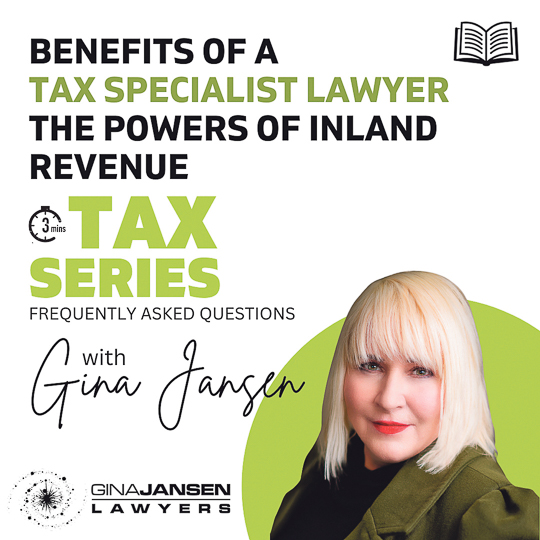As tax dispute lawyers, we have been representing New Zealand taxpayers since 2007. We are therefore very familiar with the Tax Administration Act 1994 and have the necessary skills and experience to strategically work and negotiate with Inland Revenue to resolve tax disputes.
Time and again, we have seen how overwhelmed and frustrated our clients feel when dealing with Inland Revenue on their own, in what is a never-ending, downward spiral of tax that grows exponentially. We are acutely aware of our clients’ pain. Our job is to advocate for our clients and get resolution. For these reasons, it is crucial that when it comes to dealing with Inland Revenue, taxpayers should not delay in seeking out legal advice from specialist tax dispute lawyers as early as they can. In some instances, taxpayers may even be criminally prosecuted.
Who can Inland Revenue prosecute?
Both individuals and legal entities, such as companies and limited partnerships, can be prosecuted by Inland Revenue for various “tax evasion” acts. Some examples are: not declaring all income earned, failing to file tax returns, employers failing to pay PAYE deductions, and claiming expenses when there is no entitlement.
What will Inland Revenue do if they are going to prosecute me?
Like any government agency tasked with prosecution powers (such as the Police, MSD, Customs and MPI for example), Inland Revenue must collect sufficient evidence to lay charges under the Tax Administration Act. Sometimes this is achieved by interviewing a taxpayer, or by obtaining documents and information from third-party sources. The sole objective is to build a case against you. In many instances, this process starts with a letter requesting the taxpayer attend an interview at the Inland Revenue offices. The letter may state that the interview is voluntary. On receipt of an interview request letter, taxpayers should, without any delay, immediately consult with a tax specialist lawyer before attending an interview. What may be unwittingly and innocently said could bring about very serious criminal charges, against which a subsequent defence may not be able to be mounted. As tax lawyers, our objective is to ensure our clients understand, in advance, the consequences of verbal statements made to Inland Revenue and to protect them from making inadvertent admissions of guilt.
I’m being audited by Inland Revenue. Why?
Taxpayers are audited to ensure that the tax laws are being complied with. How taxpayers are selected for audit includes: randomly, by industry/sector, by anonymous persons providing information to Inland Revenue, or by failing to file tax returns and/or pay income tax on time. Audits don’t necessarily mean the taxpayer has done anything wrong, and the audit may only result in minor errors needing to be fixed. However, if major errors are detected, Inland Revenue may perceive this as a deliberate attempt to reduce the amount of tax payable by a taxpayer.
What could happen during an audit?
Let’s be blunt: your legal rights are at risk when an audit commences. Therefore, seeking legal advice immediately is essential. Audits can sometimes commence with a knock on the door of either your business or your home, depending on where your business operates from. Inland Revenue staff may arrive with a search warrant, and the power to seize and uplift documents, laptops, hard drives, and any other information/item they deem necessary for the audit. As some information, including both accounting and legal advice, may be legally privileged under the Tax Administration Act (meaning Inland Revenue cannot have it), it is imperative only the right information is provided to Inland Revenue. Following an audit, the tax disputes process has very short and immovable timeframes within which to lodge a dispute about Inland Revenue’s assessment of your tax. If these timeframes are missed, a taxpayer cannot later dispute the amount of tax payable, which will be set in stone, nor any shortfall penalties applied (which can be between 25% to 150% of the audit assessed tax amount) along with backdated interest. As specialist tax lawyers, we ensure that the audit process is overseen by us, including attending all interviews with our clients, setting up clear lines of communication, liaising directly with IRD officials and ensuring any breaches of our clients’ legal rights are minimised.
If you have questions or receive letters from Inland Revenue, please feel free to connect with us on Instagram, Facebook, or by phone on 0800 544 508, or email us via our website at www.ginajansen.co.nz.
DISCLAIMER: the content is not be reprinted without the express permission of the author nor is it intended to be relied upon as legal advice. Please contact Gina Jansen Lawyers for legal advice.











